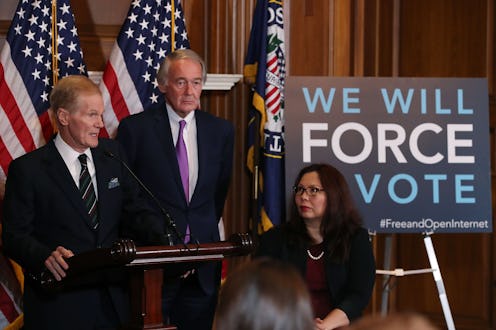News
A Vote To Restore Equal Access To The Internet Is Happening Sooner Than You Think

The fight for fair Internet speeds may not be over yet. Senate Democrats are forcing a net neutrality vote this Wednesday, according to CNN, to restore Internet laws that were put in place by the Federal Communications Commission (FCC) during President Obama's term. The vote would keep the Internet fair and open and stop Internet service providers from messing with speeds.
Net neutrality is meant to give internet users equal access to all web content and to prevent internet providers from favoring certain content over others. It's slated to end, however, on June 11. That expiration date comes after the Republican-led FCC voted along party lines to dismantle it last year. The FCC overturn of the rule governing internet speeds would allow telecom companies to charge consumers more for certain content while picking and choosing what websites stream faster to users.
The measure to keep net neutrality, though, has the support of all 49 Democrats and Republican Senator Susan Collins of Maine, per The Hill. It's expected to pass easily in the Senate but hit some major roadblocks in the Republican-controlled House. Even if it does pass the House, it will likely face another tough critic in President Trump.
The fear behind losing net neutrality is that it could hurt free speech or manipulate access to information. A telecommunications company that provides your internet could potentially speed up your access to Netflix because the two companies have a business agreement while slowing down your access to Hulu because the two haven't struck an agreement. Many say that powerful companies with deep pockets could buy preferential treatment over smaller companies. It's a fight that's even rallied the last Jedi Master.
Democratic senators are, of course, also calling for the public to keep their eyes on this issue.
“The internet should be kept free and open like our highways, accessible and affordable to every American, regardless of ability to pay” said Senate Minority Leader Chuk Schumer (D-NY) in a statement about the Wednesday vote. “The repeal of net neutrality is not only a blow to the average consumer, but it is a blow to public schools, rural Americans, communities of color and small businesses. A vote against this resolution will be a vote to protect large corporations and special interests, leaving the American public to pay the price.”
The vote on Wednesday utilizes the Congressional Review Act, which allows Congress — within a small timeframe after the rule is implemented — to reject and undo agency rules and regulations with a simple majority vote.
There's a very real possibility that this bill will fizzle out and do nothing to stop the repeal of net neutrality. But Democrats know that this issue matters to their constituents and are rallying around it, appealing to their base ahead of the midterm elections. Republicans contend that the FCC's action actually puts the internet back to the same regulations it followed in its pre-2015 years, which is what allowed the web to thrive. The ideal, argues the GOP, is for Congress to pass a law on net neutrality instead of leaving it up to federal agencies (like the FCC), which can flip-flop on the policy with each new administration.
"But instead of moving forward with that approach with Republicans to draft such legislation, the Democratic leadership decided to try to score political points by pushing a resolution to undo the FCC's decision, even though undoing this decision will do nothing to provide a permanent solution on net neutrality," said Republican Senator John Thune, who chairs the Commerce Committee that has oversight of the FCC, according to CNN.
Comcast, Verizon, and AT&T have all pledged to be fair and to refrain from discriminating against legal content after the net neutrality rules expire, according to Reuters. Still, a number of states, including New York and California, have sued to prevent the repeal of net neutrality. Business giants like Amazon, Facebook, and Netflix have all publicly expressed disappointment with the FCC and its decision to overturn it. If Wednesday's vote is successful, it could show House representatives how serious the public is about an open and fair internet and even change some minds. But it will be an uphill battle the entire way.